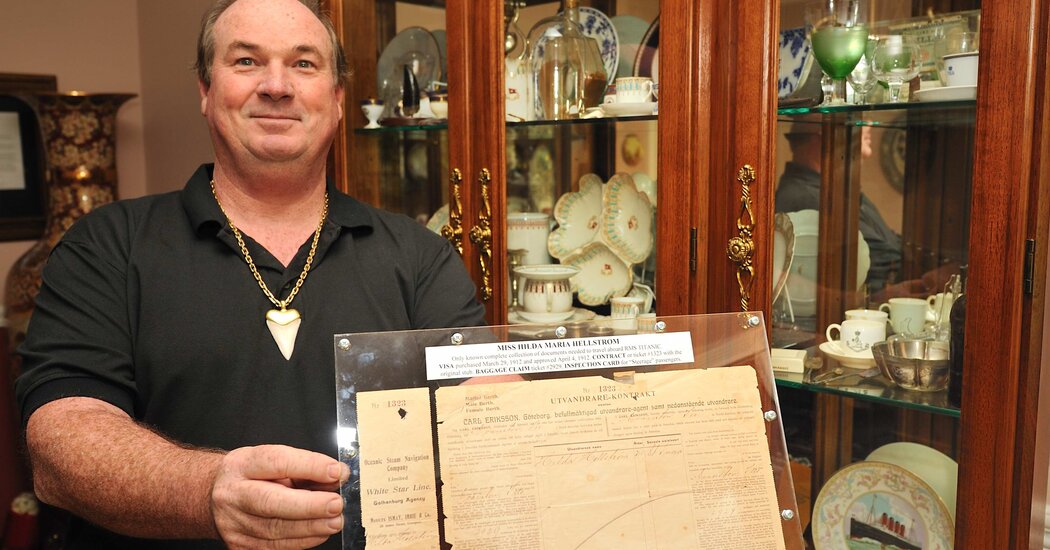Tony Probst's passion for the Titanic is unshakable.
Since the mid-1990s, he has amassed hundreds of artifacts dating back to the ship's maiden voyage in 1912, including a plaque on a lifeboat, porcelain, sheet music and a number of personal documents.
“I believe I am the only person on planet Earth who has all the necessary documents for an individual to board the Titanic,” Mr. Probst, 64, said proudly this week.
His collection is sometimes displayed in the audio and video store he runs with his children in California's Bay Area, but he has also visited notable spaces, including the National Geographic Museum in Washington; the Ronald Reagan Presidential Library and Museum in Simi Valley, California; and the Titanic museums in Branson, Missouri, and Pigeon Forge, Tennessee.
Mr. Probst's enthusiasm for the Titanic – which places him somewhere between a collector and a historian, he said – makes him part of a small but dedicated community seeking memorabilia from the ship, which sank after hitting an iceberg in the North Atlantic Ocean, killing 1,500 people.
Henry Aldridge & Son Ltd, an auction house in southwest England, will host an auction of the Titanic and other shipping and shipping memorabilia on Saturday. More than 250 items on sale include a black and white photograph of an iceberg taken by a member of a ship recovering bodies after the disaster, and bandleader Wallace Hartley's violin case, expected to fetch £120,000 . or approximately $150,000. (The violin sold in 2013 for 1.1 million pounds, or about $1.3 million.)
The reasons for seeking out Titanic items vary widely, but for Mr. Probst it is the stories of victims and survivors that motivate him to continue collecting and keeping an eye on auctions.
“There are some people out there with very, very deep pockets and, you know, they get all the best bits these days,” Probst said. “I'm not in that category. I'm really more interested in preserving stories.
Mr. Probst, who said he has recovered from a couple of large purchases, currently has nothing on his wish list, but still plans to study the auction catalog.
“I really want to pursue things that I want,” he said, or items that he might rent to museums.
“I call it my retirement account, in a way, because I understand the principle and it increases in value,” he added. “But in the meantime I can rent it out and make some money.”
According to Andrew Aldridge, managing director of the auction house, Henry Aldridge & Son has been holding semi-annual Titanic-themed sales since the late 1990s. Aldridge said bidders often had their own individual niches and motivations.
“Some just collect Titanic memorabilia, per se,” he said. “But others go a little deeper and work in detail. Specific passengers, specific classes. People who come from specific areas. We will have people just collecting items from Scandinavian passengers.”
The Titanic collector community is quite small, especially at the higher end of acquisitions, said David Scott-Beddard, president of the British Titanic Society. Competition for top items can sometimes be fierce. “In a way, it's how much I want it and how much I'm willing to spend on it, without the wife finding out,” he said.
There wasn't much concern about items disappearing from public view after being purchased, Scott-Beddard added. He said the community has been very fortunate that the majority of collectors, even those making six- and seven-figure purchases, have been generous enough to allow their pieces to be displayed to the general public.
“The Titanic is probably, next to Noah's Ark, the most famous ship in history,” said Charles Haas, president of the Titanic International Society. Some enthusiasts are driven by the search for increasingly rare artifacts taken off the ship by passengers, others by the psychological connections that collectors sometimes make, seeing the disaster through the eyes of the victims and survivors.
Mr. Haas said he wasn't sure the day would come when demand for Titanic items would wane.
“The history of the Titanic already lasts 112 years,” he said. “And even though there are people out there who say, 'The ship has sunk, get over it,' there's so much drama in it that younger generations are still quite fascinated by it.”
Mr. Haas hopes they will continue in the footsteps of current collectors, who Mr. Aldridge says are only temporary collectors custodians of the artefacts.
“The best way to describe it is: You never own these items,” Aldridge said. “Your job is to hold them while they are in your possession. Keep them safe and then pass them on to the next generation, to the next individual, to the next collector.”





